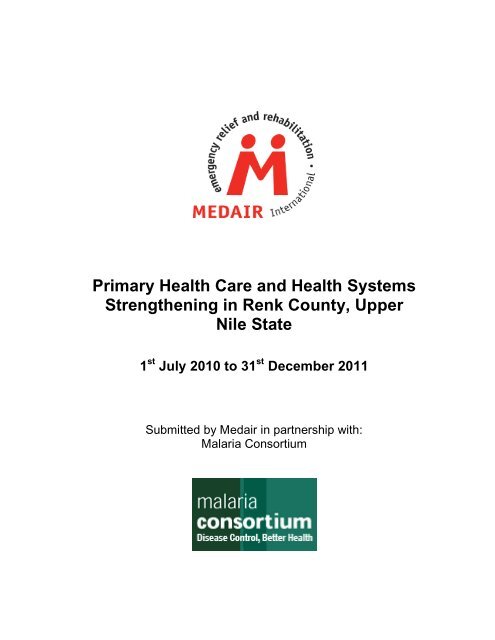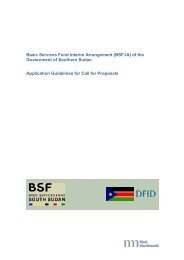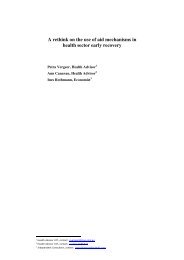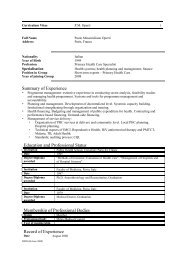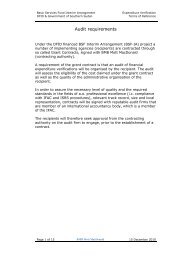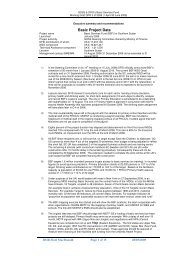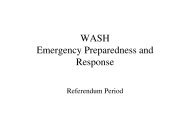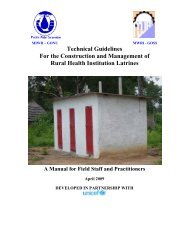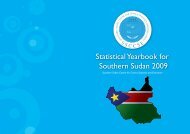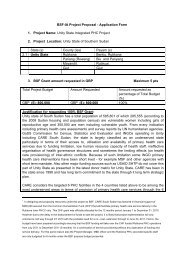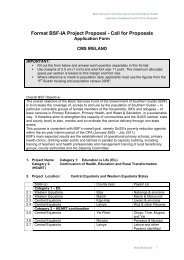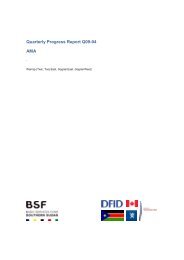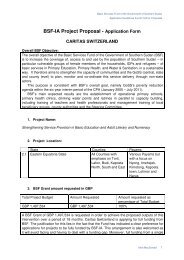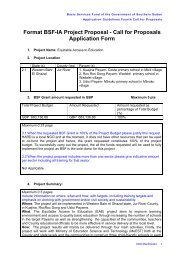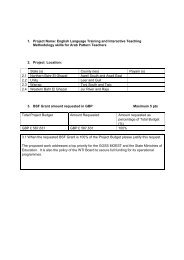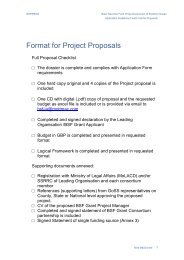MEDAIR BSF-IA Proposal - Basic Services Fund SOUTH SUDAN
MEDAIR BSF-IA Proposal - Basic Services Fund SOUTH SUDAN
MEDAIR BSF-IA Proposal - Basic Services Fund SOUTH SUDAN
You also want an ePaper? Increase the reach of your titles
YUMPU automatically turns print PDFs into web optimized ePapers that Google loves.
Primary Health Care and Health Systems<br />
Strengthening in Renk County, Upper<br />
Nile State<br />
1 st July 2010 to 31 st December 2011<br />
Submitted by Medair in partnership with:<br />
Malaria Consortium
<strong>Basic</strong> <strong>Services</strong> <strong>Fund</strong> of the Government of Southern Sudan<br />
Application Guidelines Fourth Call for <strong>Proposal</strong>s<br />
Format <strong>BSF</strong>-<strong>IA</strong> Project <strong>Proposal</strong> - Call for <strong>Proposal</strong>s<br />
Application Form<br />
Overall <strong>BSF</strong> Objective:<br />
The overall objective of the <strong>Basic</strong> <strong>Services</strong> <strong>Fund</strong> of the Government of Southern Sudan (<strong>BSF</strong>)<br />
is to increase the coverage of, access to and use by the population of Southern Sudan – in<br />
particular vulnerable groups of female members of the households, IDPs and refugees – of<br />
basic services in Primary Education, Primary Health, and Water & Sanitation, in a sustainable<br />
way. It therefore aims to strengthen the capacity of communities and the GoSS (central, state<br />
and county level) to plan, monitor and co-ordinate this service delivery through non-state<br />
actors.<br />
This purpose is consistent with <strong>BSF</strong>’s overall goal, namely GoSS’s poverty reduction agenda<br />
within the six year interim period of the CPA (January 2005 – July 2011).<br />
<strong>BSF</strong>’s main expected results are the establishment of operational primary schools, primary<br />
health clinics, drinking water points and latrines in parallel to capacity building, including<br />
training of teachers and health professionals and management training of local beneficiary<br />
groups, county authorities and the Steering Committee.<br />
1. Project Name:<br />
Primary Health Care and Health Systems Strengthening - Renk County, Upper Nile<br />
State<br />
2. Project Location:<br />
State County Payam(s)*<br />
2.1 Upper Nile State Renk North Renk<br />
2.2 Upper Nile State Renk South Renk<br />
2.3 Upper Nile State Renk Chemmedi<br />
2.4 Upper Nile State Renk Gerger<br />
2.5 Upper Nile State Renk Jalhak<br />
*Exact locations of operation will be determined in conjunction with the County Health<br />
Department, following further joint assessment in the first quarter of the project period.<br />
3. <strong>BSF</strong> Grant amount requested in GBP Maximum 5 pts<br />
Total Project Budget Amount Requested Amount requested as<br />
percentage of Total Budget:<br />
(%)<br />
GBP: 1.7 mio GBP 1.5 mio 88 %<br />
3.1 When the requested <strong>BSF</strong> Grant is 100% of the Project Budget please justify this request.<br />
3.2 When the requested <strong>BSF</strong> Grant is less than 100% please name source(s) of this<br />
Mott MacDonald 3
<strong>Basic</strong> <strong>Services</strong> <strong>Fund</strong> of the Government of Southern Sudan<br />
Application Guidelines Fourth Call for <strong>Proposal</strong>s<br />
additional funding and specify what arrangements are in place in case this funding cannot be<br />
realised; consequences of this event must be specified<br />
Medair have confirmed funding from Common Humanitarian <strong>Fund</strong> (CHF) that will cover the<br />
shortfall through the end of the year. Medair have applied for funding from Chaine du Bonheur<br />
(CdB).<br />
If we do not receive the requested funding from CdB, Medair will seek private funding along<br />
with possible request back to BSD and other donors for top up funding at a later stage.<br />
3.3 When the requested <strong>BSF</strong> Grant is less than 100%, please specify the approximate timing<br />
of spending the <strong>BSF</strong> grant.<br />
<strong>BSF</strong> can expect roughly 30% of the total budget to be spent in the first 6 months and then the<br />
remaining 70% in the last 12 months.<br />
3.4 When the project proposal includes more than one sector please give indicative amount<br />
per sector including all training for that sector.<br />
Medair is requesting 1,050,468 GBP from <strong>BSF</strong> for the health sector or which 76,851 GBP is<br />
for training and 213,780 GBP for the Water and Sanitation sector of which 26,225 GBP is for<br />
training<br />
4. Project Summary:<br />
The overall objective of the project is to improve access to and use of good quality primary<br />
health care and directly related water and sanitation services for the 137,751 residents of<br />
Renk County, including IDPs, returnees and host communities. The project builds on three<br />
years experience of implementing primary health care services in neighbouring Melut County,<br />
and twelve months in Manyo County, and on one year’s experience of working in partnership<br />
with the CHDs in these counties since their appointment in early 2009. Medair plans to work<br />
together with Malaria Consortium to build the capacity of the County Health Departments.<br />
Renk County is not currently served by any NGO in the health sector. Use of PHC services by<br />
the large population is very low (less than 0.1 consultations per person per year). In this<br />
project period, from July 2010 to December 2011, support will be provided to expand<br />
coverage of PHC services to 50% of the population. The Southern Sudan BRIDGE<br />
programme is implementing WASH activities in Renk County through a consortium of NGOs.<br />
Medair is co-ordinating with this consortium to avoid duplication of activities. Communities<br />
served by four supported health facilities will be targeted for new or improved water and<br />
sanitation facilities. The project aims to work towards sustainability, by building government<br />
capacity to manage and supervise services at state and county level (working in close<br />
partnership with the State Ministry of Health and County Health Departments), and by building<br />
community capacity to adopt healthier behaviours, demand basic services, and support<br />
health, water and sanitation facilities.<br />
CHD members will receive 300 training days (250 male and 50 female) in planning and<br />
Mott MacDonald 4
<strong>Basic</strong> <strong>Services</strong> <strong>Fund</strong> of the Government of Southern Sudan<br />
Application Guidelines Fourth Call for <strong>Proposal</strong>s<br />
budgeting, health information management systems (HMIS), clinical supervision and IT. PHC<br />
clinical staff will receive 550 formal and in-service training days (410 for male; 140 for female)<br />
to improve the quality of service provision, and existing TBAs will receive 270 training days (0<br />
male; 270 female) on recognition of danger signs and appropriate referral of deliveries.<br />
Members of water and sanitation committees will receive 120 training days (72 female; 48<br />
male) on supporting health and water services. Community members nominated as health<br />
and hygiene promoters will participate in 120 training days (72 for female; 48 for male) to<br />
promote community-led behaviour change to improve health and hygiene, including<br />
sanitation. Four pump mechanics will receive 12 training days (9 for male; 3 for female) on the<br />
good use, maintenance and repair of hand pumps.<br />
5. Project Objective:<br />
The objective of the project from July 2010 to December 2011 is to improve access to good<br />
quality primary health care in line with the <strong>Basic</strong> Package of Health <strong>Services</strong> (BPHS). Water<br />
and sanitation services will be improved for the populations of Renk County and all of the<br />
health facilities that Medair rehabilitate will have improved access to water and sanitation<br />
services. Service utilization will be used as a proxy measure for access to health services,<br />
and changes in health facility scores on a standardised supervision tool as a measure of<br />
quality improvement.<br />
6. Justification: Maximum 40 pts<br />
6.1 Relevance of the project to <strong>BSF</strong>’s overall objectives.<br />
This new project will directly contribute to <strong>BSF</strong>’s overall objectives by increasing coverage,<br />
access and use by the population of Renk County of primary health care and water and<br />
sanitation services. Less than half of existing MoH PHC facilities in Renk County are<br />
functioning. Even functioning facilities are poorly accessed, with a health facility utilization rate<br />
of less than 0.1 consultations per person per year. 1<br />
In accordance with <strong>BSF</strong>’s aim of working towards sustainability, the project will work to<br />
strengthen community and government capacity to demand, support and manage these basic<br />
services, with particular emphasis on developing the capacity of the County Health<br />
Department (CHD). The CHD have already participated in initial assessments in Renk<br />
County, and will be closely involved in project design, implementation and monitoring, in<br />
keeping with <strong>BSF</strong>’s core principles.<br />
6.2 GoSS sector priorities addressed? (10 pts)<br />
This project will expand provision of primary health care services to a new county, achieving<br />
50% coverage by the end of the project period, which meets a key GoSS MoH target.<br />
The project also addresses the remaining health sector priorities by:<br />
• providing support for formal and in-service training of health workers;<br />
• supporting the MoH to strengthen Renk County Health Department;<br />
• strengthening community governance structures including village committees;<br />
1 Malaria Consortium Health Facility Mapping, Renk County, 2009<br />
Mott MacDonald 5
<strong>Basic</strong> <strong>Services</strong> <strong>Fund</strong> of the Government of Southern Sudan<br />
Application Guidelines Fourth Call for <strong>Proposal</strong>s<br />
• focusing on MoH priorities in delivery of the basic package of health services.<br />
This project includes the introduction of water and sanitation services into communities<br />
served by supported health facilities, and therefore also contributes to the Ministry of Water<br />
Resources and Irrigation (MWRI) targets including access to clean water, latrine construction,<br />
training of pump mechanics, community hygiene and sanitation training, and rehabilitation of<br />
water points.<br />
6.3 Priority Counties Targeted? (20 pts)<br />
Renk County is a GoSS priority county for the health sector. It is not served by <strong>BSF</strong> or any of<br />
the other four funding mechanisms. Medair has specifically been invited to work in Renk<br />
County by the Upper Nile State Ministry of Health because of the unmet need for primary<br />
health care provision and CHD development in the county.<br />
6.4 Target beneficiary groups: needs and constraints. (0 points specifically<br />
allocated)<br />
The target population of the project is the 137,751 residents of Renk County. 2 IDPs and<br />
returnees are present in the county, but there are no reliable estimates of their numbers.<br />
In accordance with GoSS MoH policy, no user fees will be charged at supported health<br />
facilities. There will therefore be no financial barriers to accessing health services, which will<br />
be open to all population groups within Renk County including the host population, IDPs and<br />
returnees.<br />
6.5 Targeting of women and girls. (10 pts)<br />
The target population includes an estimated 14,464 girls under five years of age (10.5%), and<br />
an estimated 34,438 women of childbearing age (25%). In 2009 in neighbouring Melut<br />
County, 23% of outpatients were under five years of age, and 56% were female. The project<br />
aims to improve the quality of primary health care services, particularly focusing on the<br />
treatment of the major causes of mortality and morbidity in children (malaria, diarrhoea,<br />
pneumonia, and malnutrition) and on maternal mortality (through improving antenatal care<br />
and appropriate referral for deliveries).<br />
The project also aims to improve access to water and sanitation, which has a particular<br />
benefit to women and girls who bear much of the burden of collecting water and are<br />
particularly disadvantaged by the lack of private sanitation facilities.<br />
The project will encourage communities to nominate women to join village water committees,<br />
and for training as water technicians (including pump mechanics).<br />
2 Population figures from 2008 Census data.<br />
Mott MacDonald 6
<strong>Basic</strong> <strong>Services</strong> <strong>Fund</strong> of the Government of Southern Sudan<br />
Application Guidelines Fourth Call for <strong>Proposal</strong>s<br />
7. Description of activities per result and sector: Maximum 5 pts<br />
7.1 Project outputs and activities.<br />
PHC Result 1 & PHC Training Result 1. Trained County Health Department involved in<br />
planning and management of PHC services.<br />
The sustainability of health interventions in Renk County will be dependent on the County<br />
Health Department’s (CHD) capacity to continue to provide the required support to health<br />
facilities at the conclusion of this project. To help ensure the CHD is ready for the increased<br />
responsibility Malaria Consortium will work with the CHD to help them to develop a workplan.<br />
Based on this workplan a small recurrent budget will be made available to the CHD with<br />
requirements for the CHD to account for their expenditure on the budget. The recurrent<br />
budget will be used by the CHD for core functions such as supportive supervision, collection<br />
of routine data, surveillance activities, pharmaceutical supply distribution, and coordination.<br />
Training will be provided to the CHD staff on these key functions. Malaria Consortium staff will<br />
also accompany the CHD teams to provide coaching for improving quality of interventions.<br />
In order to achieve the sustainable delivery of health services in Renk the key CHD<br />
strengthening activities will include:<br />
• Construction of an office to facilitate the work of the CHD and formalize their role<br />
leading to improved motivation and effectiveness of the CHD<br />
• Construction of a warehouse facility for pharmaceutical supplies. This will allow the<br />
County to play a central role in pharmaceutical distribution and further institutionalize<br />
them as the focus of health delivery in the county<br />
• Training on planning will allow the CHD to develop realistic work plans that help focus<br />
the work of the CHD on the key functions of that office<br />
• Training on budgeting and budget execution with practical application on a small<br />
recurrent budget provided through this project will start to give the CHD a realistic<br />
picture of the cost of running the health services in their county.<br />
• Supportive Supervision and Health Management Information Systems training for the<br />
CHD will allow the CHD to get out and ensure that services at facilities are being<br />
delivered to a high level of quality and that accurate reporting is being fed back to<br />
County and State level<br />
• Regular meetings of CHDs together with the State MoH will help develop a<br />
coordinated and formalized relationship between the State MoH and the CHDs in<br />
Upper Nile State.<br />
Further work will be done to improve quality of laboratory services at county level. This will<br />
include working to develop a laboratory manual for diagnosis. Given the low literacy levels of<br />
health staff in Renk County and the heavy reliance on Arabic Malaria Consortium will work to<br />
develop job aids for clinics which are designed to be low literacy and tailored to the services<br />
outlined in the BPHS.<br />
PHC Result 2 & PHC Training Result 2. Trained staff at two primary health care centres and<br />
five primary health care units provide improved quality PHC services in line with the BPHS.<br />
At the start of the project period, Medair will conduct a joint assessment of primary health care<br />
provision in Renk County with the CHD. This will build on and update a Malaria Consortium<br />
health facility mapping exercise and a Medair assessment carried out in 2009.<br />
As early as possible in the project period, depending on access during the rainy season,<br />
Medair will carry out a formal survey to collect baseline data including: major causes of<br />
Mott MacDonald 7
<strong>Basic</strong> <strong>Services</strong> <strong>Fund</strong> of the Government of Southern Sudan<br />
Application Guidelines Fourth Call for <strong>Proposal</strong>s<br />
morbidity and mortality; EPI coverage; nutritional status; health and hygiene knowledge and<br />
practices; and access to water and sanitation.<br />
Using the information gained from the initial assessment and/or baseline survey, Medair will<br />
work with the CHD to finalise details of project planning and implementation at health facility<br />
level. To provide 50% coverage of PHC services, up to 7 health facilities (two PHCCs and five<br />
PHCUs) will be identified and selected in consultation with the CHD and SMoH. These will be<br />
supported with medical equipment appropriate for BPHS service delivery, and with essential<br />
drugs to supplement MoH supplies. Ensuring continuous availability and preventing stock<br />
outs of the 10 essential drugs identified by the MoH will be prioritised, and any additional<br />
drugs supplied will be in accordance with the MoH essential drug list. Drugs will be distributed<br />
in collaboration with the CHD, building on their existing drug management and supply system.<br />
Of the seven health facilities, up to four will be selected for rehabilitation to provide a<br />
permanent clinic building.<br />
The project will focus on improving quality of care at health facilities, particularly clinical<br />
management of the main causes of morbidity and mortality (malaria, diarrhoea, lower<br />
respiratory tract infection and malnutrition) and improving the quality of antenatal care and<br />
referral for deliveries. Clinical staff working at all GoSS MoH supported health facilities in<br />
Renk County will be offered quarterly week-long refresher trainings. Topics will be drawn from<br />
the MoH treatment guidelines, and will be selected with the CHD according to the priorities<br />
identified above, and the training needs identified during supervision visits. At least one<br />
training will focus on the IECHC guidelines. TBAs associated with GoSS MoH health facilities<br />
will be offered training on identification of danger signs and appropriate referral for deliveries.<br />
All trainings will be planned in conjunction with the CHD. CHD members will be invited to give<br />
training in line with their expertise, and offered coaching in teaching skills.<br />
A plan will be drawn up with the CHD for regular joint supervision visits, to be carried out at<br />
least quarterly to each functioning GoSS MoH health facility. A structured health facility<br />
supervision tool will be developed in collaboration with the CHD and Malaria Consortium, who<br />
will provide training and coaching in supportive supervision. Supervision visits will be used by<br />
the Medair PHC supervision team to monitor stock levels of essential drugs, assess quality of<br />
care, provide on-the-job training, and collect data.<br />
WASH Result 1. Four communities served by rehabilitated health facilities have improved<br />
access to sustainable clean water and improved sanitation.<br />
Medair will rehabilitate four water points directly related to the primary health care facilities.<br />
The locations of health facilities receiving rehabilitation support from Medair will be<br />
determined through a joint assessment by Medair and the County Health Department. The<br />
details of water sources will be confirmed during this assessment. An initial assessment of<br />
four MoH supported health facilities in Renk county indicated that communities away from the<br />
Nile rely on open shallow wells and rainwater catchment dams. Where appropriate, Medair<br />
will support the communities accessing health facilities to cover wells and fit them with a hand<br />
pump and to deepen earthen dams and install intake wells to improve the quality of extracted<br />
water.<br />
Medair’s assessment also revealed that in towns with health facilities along the Nile, water<br />
distribution systems provide water to tap stands in the town, however this water is often<br />
untreated, and unreliable in terms of quality and quantity. Medair will work with the community<br />
Mott MacDonald 8
<strong>Basic</strong> <strong>Services</strong> <strong>Fund</strong> of the Government of Southern Sudan<br />
Application Guidelines Fourth Call for <strong>Proposal</strong>s<br />
to find acceptable, sustainable point-of-use water treatment for households. Techniques may<br />
include: solar water disinfection, household sand filters, clay pot filters or social marketing of<br />
water treatment chemicals.<br />
Medair will also construct latrines and hand washing facilities at each of the supported health<br />
facilities<br />
WASH Training Results 1, 2 & 3. Improved sustainability of water and sanitation services<br />
through capacity building of communities.<br />
All rehabilitated water sources will be managed by a water committee. Medair will facilitate the<br />
nomination or re-commissioning of these committees and provide initial or refresher training.<br />
The training will focus on the physical care taking, ownership, rights to access and financial<br />
management of water sources.<br />
Alongside the training of water committees, pump mechanics nominated by their communities<br />
will be trained to assist the water committees with the maintenance and repair of hand pumps<br />
on rehabilitated shallow wells and intake wells. This training will be given in-service by Medair<br />
WASH technicians.<br />
Participatory community hygiene promotion will be carried out in each of the locations with a<br />
supported health facility. This training is carried out through community volunteers and will<br />
cover use of safe water and good hygiene and sanitation practices.<br />
7.2 Specify the role of each partner per output, if applicable, and describe the added<br />
value of each member of the proposed consortium.<br />
Organisation Roles Added value<br />
Medair (lead) • Coordination of consortium<br />
• Health facility support (drugs,<br />
equipment, supervision, training,<br />
rehabilitation)<br />
• WASH activities<br />
• Village water committee training<br />
and support<br />
Malaria Consortium • SMoH support<br />
• CHD development<br />
• Technical expertise in laboratory<br />
diagnostics<br />
Three years experience of<br />
BPHS implementation in<br />
Upper Nile State.<br />
Current community-based<br />
WASH activities in Upper<br />
Nile State.<br />
Expertise in health systems<br />
strengthening, with<br />
experience at county and<br />
state level in Upper Nile.<br />
Experience building<br />
laboratory capacity at<br />
Malakal Teaching Hospital.<br />
Mott MacDonald 9
<strong>Basic</strong> <strong>Services</strong> <strong>Fund</strong> of the Government of Southern Sudan<br />
Application Guidelines Fourth Call for <strong>Proposal</strong>s<br />
8. Methodology: Maximum 35 pts<br />
8.1 Method of implementation. (5 points)<br />
The project has been designed to use proven methods of implementation to achieve its<br />
results. In addition, the consortium members have 12 years of experience with other projects<br />
in Upper Nile State and this experience will be incorporated throughout this new project.<br />
Experience elsewhere has shown that if an NGO performs the functions of the CHD, the CHD<br />
may lack clarity of purpose and authority. Therefore the Renk CHD will be supported to lead<br />
as much as possible in the choice of project design, and in project implementation and<br />
monitoring. NGO visibility will be kept low, as this has been seen to promote CHD and<br />
community ownership of health facilities and their services. For the same reason, no regular<br />
salaries or incentives will be paid to MoH health facility staff or the CHD. Instead, per diems<br />
will be paid, for example for attendance at training sessions, and the CHD will be offered<br />
performance based incentives.<br />
Malaria Consortium’s previous experience working with County Health Departments in Upper<br />
Nile State has shown that there is generally a considerable appetite for knowledge and<br />
interest in improving quality of services in the county. This enthusiasm is often tempered by a<br />
lack of access to resources, lack of clarity around the basic functions of the CHD, low staffing<br />
levels, and often weak capacity levels within the CHD and facilities. Malaria Consortium has<br />
found that a strong partnership with the CHD encourages much more active participation in<br />
health activities by the county which improves motivation and results in a positive cycle of<br />
improving CHD capacity and resulting enthusiasm for health services management.<br />
GoSS MoH have committed to using a basic package approach to provision of primary health<br />
care, which as been shown in other developing countries to improve access and coverage.<br />
The final version of the BPHS outlines an ambitious range of service provision. Support for<br />
implementation of the 13 priority areas of the BPHS identified by the MoH will be prioritised.<br />
These areas are arguably the most essential, and also the most likely to be sustainable by the<br />
MoH.<br />
At health facility level, experience in other counties has shown it to be unrealistic to expect<br />
health workers with relatively low levels of training and literacy to change their practice quickly,<br />
especially if multiple clinical areas are addressed simultaneously. Therefore, in this project<br />
period, in-service and formal training will be targeted at improving case management for the<br />
major causes of morbidity and mortality, particularly amongst women and children, as<br />
identified from neighbouring counties and national sources. 3 Training and supervision will<br />
focus on implementation of: WHO Southern Sudan-specific Integrated Essential Child Health<br />
Care (IECHC), based on the internationally proven Integrated Management of Childhood<br />
Illness (IMCI) approach, and focused antenatal care and appropriate referral for deliveries as<br />
outlined in the BPHS. This approach is in line with the BPHS priorities of improvement of<br />
maternal and child health and control of communicable diseases.<br />
Sustainability of water and sanitation services grows out of communities’ understanding,<br />
acceptance and ownership of the services that Medair are supporting. Medair has successfully<br />
used participatory health and hygiene promotion and water committee training in emergency<br />
response projects and a similar approach is currently being piloted in Upper Nile State with<br />
funding from MDTF. This approach emphasizes community ownership and participation<br />
Mott MacDonald 10
<strong>Basic</strong> <strong>Services</strong> <strong>Fund</strong> of the Government of Southern Sudan<br />
Application Guidelines Fourth Call for <strong>Proposal</strong>s<br />
throughout to ensure sustainability.<br />
The training approach for the hygiene promotion workshops uses methods from PHAST<br />
(participatory hygiene and sanitation transformation) and CLTS (community-led total<br />
sanitation). These are innovative methodologies to improve hygiene behaviour, and help<br />
participants to identify faecal-oral transmission routes and their barriers, and to find<br />
community-generated solutions. Medair will not suggest techniques or designs to the<br />
community but can assist them with developing and testing community-generated ideas.<br />
This project period will include two rainy seasons and the Sudanese national referendum on<br />
the secession of the southern states. Previous operations in the rainy season, especially in the<br />
difficult black cotton soil of Upper Nile State, have shown the importance of making good use<br />
of the dry season for rehabilitation work, and for prepositioning drugs and supplies at health<br />
facilities with difficult access during the rains. Experience of contingency planning for the<br />
Sudanese national elections will be useful in preparing for the referendum. Should there be<br />
significant insecurity during the referendum period, Medair will draw on extensive experience<br />
of remote programming in both Southern and North Sudan.<br />
3 Health facility epidemiological reporting, Melut County, 2009; Medair baseline survey, Manyo County, November 2008; South<br />
Sudan Household Survey, 2006.<br />
8.2 Consortium arrangements.<br />
Medair and Malaria Consortium have been working in consortium elsewhere since April 2009.<br />
This project will build on existing working relationships and experience to date. Medair will act<br />
as lead agent for managing contractual arrangements, reporting, and coordination.<br />
Coordination will be essential, and will facilitate a unified approach to working with the CHD<br />
and local communities, and also enable discussion of implementation issues, mutual learning,<br />
review of progress, and future planning. At field level, teams will work closely day-to-day, and<br />
coordinate more formally at least once a fortnight. At state level, project management from<br />
each organisation will meet at least every two months. Reporting will be coordinated by<br />
Medair and timely input will be requested from Malaria Consortium throughout the project<br />
period. An agreement will be signed between partners and any differences will be addressed<br />
at the first opportunity to ensure good working relationships.<br />
8.3 Team proposed for implementation. (10 points)<br />
Upper Nile State<br />
Partner<br />
Duration<br />
(months)<br />
Key responsibilities<br />
Project Manager Health M 7 Management of health<br />
components<br />
Project Manager WASH M 7 Management of water and<br />
sanitation components<br />
Project Coordinator M 7 Coordination of health and<br />
WASH programme<br />
MC 7 Support to the CHD health<br />
Area Coordinator<br />
systems strengthening<br />
Planned post-holder<br />
International doctor<br />
International engineer<br />
International Public<br />
Health specialist<br />
Public Health Specialist<br />
Mott MacDonald 11
<strong>Basic</strong> <strong>Services</strong> <strong>Fund</strong> of the Government of Southern Sudan<br />
Application Guidelines Fourth Call for <strong>Proposal</strong>s<br />
Project Coordinator<br />
Behavior Change<br />
Communication Specialist<br />
Renk County<br />
Team Leader PHC<br />
programme<br />
MC 7<br />
MC 4<br />
Support the<br />
implementation of the<br />
project<br />
Developing resources for<br />
BCC<br />
M 18 Implementation of health<br />
facility support, training<br />
and supervision<br />
Medical Manager M 18 Implementation of health<br />
facility support, training<br />
and supervision<br />
PHC supervisor M 16 Implementation of health<br />
facility support, training<br />
and supervision<br />
Construction supervisor M 10 Supervision of health<br />
facility rehabilitation<br />
HHP supervisor M 8 Supervision of HHP<br />
activities<br />
WASH technician M 18 Supervision of<br />
construction work;<br />
technical training<br />
Laboratory Specialist MC 4 Develop laboratory<br />
manual<br />
Community<br />
Liaison/Translator<br />
M 18 Liaison of project activities<br />
in the community<br />
Community Liaison Officer M 18 Implementation of HHP<br />
activities<br />
Health Systems Project<br />
Officer<br />
MC 12<br />
Implementation of County<br />
level HSS work with the<br />
County Health<br />
Department<br />
*Please see Annex 7: CV of proposed <strong>BSF</strong> Grant Project Manager<br />
International project<br />
manager<br />
International BCC<br />
specialist<br />
International medical<br />
staff<br />
International Medical<br />
Staff<br />
National clinical<br />
officer/nurse<br />
International<br />
construction<br />
professional<br />
HHP specialist<br />
International technician<br />
International laboratory<br />
technician<br />
National capacity builder<br />
National HHP specialist<br />
Clinical Officer<br />
8.4 Partnership with government and civil society. (10 points)<br />
Medair and Malaria Consortium regularly attend national and state level MoH health sector<br />
coordination meetings. At national level Medair has seconded a public health specialist to<br />
support the Ministry of Health and UN/NGO Coordination for the purpose of health systems<br />
strengthening and capacity development within the Ministry, as well as representing NGO<br />
interests as co-sector leads for the health and WASH sectors. In Upper Nile State, Malaria<br />
Consortium act as secretariat for the State Level Health Forum in Malakal. There are no other<br />
NGOs operating in the health sector in Renk County. Medair is coordinating with the NGOs<br />
involved in the South Sudan BRIDGE programme in Renk County, to ensure there is no<br />
duplication; this coordination will continue throughout the project period.<br />
The SMoH and CHD have been involved in Medair’s decision to seek funding to work in Renk<br />
County. The SMoH has requested Medair to support BPHS implementation in Renk County.<br />
During assessment visits, the Renk CHD has also welcomed this.<br />
Mott MacDonald 12
<strong>Basic</strong> <strong>Services</strong> <strong>Fund</strong> of the Government of Southern Sudan<br />
Application Guidelines Fourth Call for <strong>Proposal</strong>s<br />
Ongoing WASH projects in Upper Nile State are financed through the Ministry of Water<br />
Resources and Irrigation (MWRI) and in collaboration with the State Supervisor for the MWRI<br />
and the Upper Nile State Ministry of Infrastructure and the Directorate of Rural Water Supply<br />
and Sanitation.<br />
Entry workshops will be held with key stakeholders (including county and payam authorities;<br />
the CHD; and civil society groups). These will provide a participatory forum for priority setting,<br />
an opportunity to clarify expectations and responsibilities, and a chance to identify civil society<br />
groups for potential partnerships. Early in the project period, state and county level MoUs will<br />
be agreed and signed, to promote accountability from all partners.<br />
8.5 Exit strategy. (10 points)<br />
The consortium recognises existing government and community capacity in Renk County, and<br />
will seek to enter the county with low visibility and avoid creating dependency by working to<br />
strengthen existing systems from within. The key requirements for sustainability of primary<br />
health care, water and sanitation provision in Renk County and project activities to build<br />
government and community capacity and entry into service provision are outlined below.<br />
Requirements for exit/<br />
sustainability<br />
County-level supervision and<br />
management of health services<br />
Regular payment of health<br />
facility salaries<br />
Adequate drug and medical<br />
supplies<br />
Provision for physical<br />
maintenance of health facilities<br />
Operation and maintenance of<br />
water sources<br />
Communities demand, initiate,<br />
take ownership of, and support<br />
health services, water and<br />
sanitation.<br />
Consortium training and capacity building plans<br />
County Health Department development (as<br />
described in Section 7.1, Output 2, above).<br />
Advocacy for regular payment of staff on MoH and<br />
county/payam payrolls<br />
Advocacy for appropriate and adequate MoH drug<br />
kits; Medair drug procurement kept in line with MoH<br />
essential drug list; health facility staff trained and<br />
coached in rational drug use<br />
Involvement of CHD in management of maintenance<br />
and repairs, and administration of a small budget<br />
Capital cost of improved water sources and point-ofuse<br />
treatment covered, capacity building of<br />
communities to assume responsibility for operation<br />
and maintenance of water sources from hand-over<br />
Support for CHD, local authorities and water<br />
committees to promote awareness and uptake of<br />
free primary health care services, and support for<br />
health facilities and water sources. Participatory<br />
health and hygiene promotion to enable communities<br />
to initiate their own improvements.<br />
The consortium recognizes that many external factors will influence whether the key<br />
requirements for sustainability are reached by December 2011. Regular review of progress<br />
towards the key requirements will be undertaken. If progress is poor in particular areas, the<br />
consortium will consider continuing programming, and/or looking for an alternative handover<br />
partner for these areas, for example an NGO with a more developmental focus.<br />
Mott MacDonald 13
<strong>Basic</strong> <strong>Services</strong> <strong>Fund</strong> of the Government of Southern Sudan<br />
Application Guidelines Fourth Call for <strong>Proposal</strong>s<br />
9. Logical Framework: Maximum 5 pts<br />
9.1 Logical Framework. Please see Annex 2.<br />
9.2 Monitoring plans. (5 points)<br />
Sources of verification for individual indicators are outlined in the logframe. A database will be<br />
developed to facilitate collation and analysis of epidemiological and service provision data<br />
from all supported health facilities. A standardized health facility quality assessment tool will<br />
be developed to monitor progress in improvement of quality of clinical care provided at health<br />
facilities.<br />
Progress towards objectives will be monitored through weekly Medair field level team<br />
meetings, monthly Medair internal situation reports, bi-monthly state-level consortium<br />
coordination meetings, quarterly progress meetings between the Medair management team<br />
and project managers, and bi-annual field visits conducted by the desk officer from HQ.<br />
Technical quality will be ensured by the Medair sector advisors, who provide technical support<br />
and supervision to field staff through quarterly field visits, monitoring of monthly reports, and<br />
advice as required, and by Medair’s monitoring and evaluation officer.<br />
10. Efficiency: Maximum 5 pts<br />
Efficiency in this context is a measure of how economically resources and inputs, funds,<br />
expertise, and time etc. are converted into results or deliverables.<br />
10.1 Relationship between direct and indirect costs<br />
Medair’s direct costs for the project, which include internal country support cost, are<br />
1,388,889 GBP which equates to 92%. Indirect costs, which are administration and audit fees<br />
are 111,111 GBP, which is 8% of the project.<br />
10.2 Unit costs of main deliverables<br />
The cost per beneficiary for the 137,751 population of Renk County served by the CHD is 11<br />
GBP. This includes rehabilitation of up to 4 health facilities and construction of 2 new<br />
structures for CHDs within Renk County. Cost for supporting MoH provision of PHC for 50%<br />
of the population (including top-up drugs, medical equipment, furnishings, transport of referral<br />
patients, and other running costs including transport of cargo, but not including any salaries or<br />
incentives) is 10,576 GBP per facility for 7 facilities for 18 months. Formal and informal<br />
training for 820 health facility staff and TBAs will be provided at a cost of 31 GBP per person<br />
per day which includes the cost of training materials, food and living expenses for trainees<br />
from outlying locations within the County.<br />
Medair’s water and sanitation programme collaborates with the primary health care<br />
programme and will ensure that each supported health facility has access to an improved<br />
water source. Pump mechanics receive 12 training days at a cost of 21 GBP a day. Health<br />
and hygiene promoters receive 120 trainings days at a cost of 11 GBP per day this includes<br />
training on household water treatment.<br />
Mott MacDonald 14
<strong>Basic</strong> <strong>Services</strong> <strong>Fund</strong> of the Government of Southern Sudan<br />
Application Guidelines Fourth Call for <strong>Proposal</strong>s<br />
11. Potential Impact: Maximum 5 pts<br />
This project has potential to contribute towards the goal of improving the health of the<br />
137,751 residents of Renk County, including IDPs and returnees. In the short term, the<br />
project aims to increase the existing very low coverage of primary health care services and<br />
directly related water and sanitation services, and to increase the quality of care offered for<br />
the major causes of morbidity and mortality. Through increasing the capacity of the CHD and<br />
communities, the project aims to work towards sustainability of these improvements in the<br />
long term. Improving access to basic services, particularly health care, has potential to<br />
increase population stability, equity between population groups, and quality of life, and<br />
therefore reduce the likelihood of conflict. Women and children will be impacted most by the<br />
project, as they have higher health facility utilisation rates, suffer most from the causes of<br />
morbidity and mortality which have been prioritised for this project period, and are most<br />
affected by difficult access to clean water and lack of sanitation facilities.<br />
The main potential negative impact of the project is an increase in dependency. At state and<br />
county level this will be mitigated by clearly agreeing government and Medair inputs through<br />
formal MoUs. At community level, the participatory approach taken to health and hygiene<br />
promotion will build on community ownership achieved to date through the health facility<br />
committees, and add capacity for community-led problem solving.<br />
12. The Lead Agent or <strong>BSF</strong> Grant Applicant:<br />
12.1 Identity<br />
Legal or business name Medair<br />
Acronym<br />
n/a<br />
Legal status<br />
SSRRC and MoLACD<br />
Official address Chemin du Croset 9<br />
CH-1024 Ecublens - Switzerland<br />
Postal address<br />
Hai Mathar, Juba, Southern Sudan<br />
Chairman of the Board<br />
(if applicable)<br />
Name: Hans Gitsels Email:<br />
hans.gitsels@louisreyners.nl<br />
Chief Executive Officer Name: Randall Zindler Email:randall.zindler@medair.org<br />
(if applicable)<br />
Contact person for the <strong>BSF</strong><br />
grant<br />
Name: Jeri Westad<br />
Email:cdsouthsudan@medair.org<br />
Telephone numbers +256 477 137 722 and +249 924 143 746<br />
Website address<br />
www.medair.org<br />
MoLACD and/or SSRRC Copies attached<br />
registration<br />
12.2 Bank Details<br />
Account name<br />
Account number<br />
Sort code<br />
Medair<br />
290-401090.64E<br />
Mott MacDonald 15
<strong>Basic</strong> <strong>Services</strong> <strong>Fund</strong> of the Government of Southern Sudan<br />
Application Guidelines Fourth Call for <strong>Proposal</strong>s<br />
IBAN / BIC<br />
SWIFT<br />
Bank name<br />
Bank address<br />
Name of signatory (ies)<br />
(Add rows as necessary)<br />
Position of signatory (ies)<br />
(Add rows as necessary)<br />
CH36 0029 0290 4010 9064 E<br />
UBSWCHZH80A<br />
UBS SA<br />
Case Postale Geneve 2, CH-1211<br />
Jim Ingram<br />
Finance Director<br />
13. Members of the Consortium (other than the Lead Agency):<br />
Legal or business name<br />
Malaria Consortium<br />
Acronym<br />
Legal status<br />
UK Registered Charity (NGO)<br />
Nationality<br />
UK<br />
Official address<br />
Plot 6, Block 2, Nimira Talata, Juba, Southern Sudan<br />
Contact person Name: Cathy O’Connor Email:<br />
c.oconnor@malariaconsortium.org<br />
Chief Executive Officer or<br />
Director and duty station<br />
(as applicable)<br />
Name: Sunil Mehra Email:<br />
s.mehra@malariaconsortium.org<br />
Chairman of the Board of<br />
Trustees/Governors<br />
(as applicable)<br />
Name: The Honourable<br />
Stephen O’Brien<br />
Telephone numbers +256 (0)477 116219 +249 (0)927 286865<br />
Fax numbers +44 207 549 0211<br />
Website address<br />
www.malariaconsortium.org<br />
Email: OBrienS@parliament.uk<br />
Mott MacDonald 16
<strong>Basic</strong> <strong>Services</strong> <strong>Fund</strong> of the Government of Southern Sudan<br />
Application Guidelines Fourth Call for <strong>Proposal</strong>s<br />
ANNEX 1: Budget format<br />
1<br />
Code<br />
Description number 1, 2 ,3 4, 5 and 6 are Main<br />
Budget Headings<br />
2 4.0 5 6 7 9 10<br />
Unit<br />
Nr<br />
Unit<br />
Unit<br />
cost<br />
Total<br />
expenses<br />
Total<br />
health<br />
Total<br />
Watsan<br />
Total<br />
support<br />
Comments<br />
1<br />
1.1<br />
Human Resources; management and administrative<br />
staff<br />
Salaries and other emoluments local staff (gross<br />
amounts)<br />
£:$<br />
forex 1.5 1.5 1.5 1.5<br />
1.1.1 PHC Supervisor (1, 89%) Month 16.0 1,358 21,728 21,728<br />
1.1.2 Community Liaison/Translator (1, 100%) Month 18.0 982 17,677 17,677<br />
1.1.3 Guards (3, 100%) Month 126.0 103 12,973 12,973<br />
1.1.4 Cook/Cleaner (3, 100%) Month 54.0 243 13,109 13,109<br />
1.1.7 Logistics Officers (1, 100%) Month 18.0 1,065 19,175 19,175<br />
1.1.8 HR Officer (1, 50%) Month 9.0 1,593 14,339 14,339<br />
1.1.9 Training for local staff Person 6.0 792 4,749 2,128 2,621<br />
Health Systems Strengthening Project Officer (1,<br />
1.1.10 100%) Month 18.0 1,171 21,076 21,076<br />
1.1.11 Logistics Officer (1, 100%) Month 18.0 650 11,709 11,709<br />
1.1.12 Finance Officer (1, 100%) Month 18.0 1,106 19,905 19,905<br />
1.1.13 Human Resources Manager (1, 20%) Month 3.6 1,171 4,215 4,215<br />
1.1.14 Boat Driver (1, 75%) Month 13.5 306 4,127 4,127<br />
1.1.15 Driver (3, 100%) Month 54.0 346 18,669 18,669<br />
1.1.16 Mcon Support Staff (4, 100%) Month 72.0 293 21,076 21,076<br />
1.1.17 Team food for local staff (9, 100%) Month 162.0 174 28,200 3,000 25,200<br />
1.1 Subtotal 232,727 145,310 87,417<br />
Mott MacDonald 17
<strong>Basic</strong> <strong>Services</strong> <strong>Fund</strong> of the Government of Southern Sudan<br />
Application Guidelines Fourth Call for <strong>Proposal</strong>s<br />
1.2<br />
Salaries and other emoluments international staff<br />
(gross amounts)<br />
1.2.1 Project Manager (1, 40%) Month 7.2 1,447 10,421 10,421<br />
1.2.2 Project Coordinator (1, 40%) Month 7.2 1,340 9,648 9,648<br />
1.2.3 Team leader for PHC project (1, 100%) Month 18.0 1,480 26,641 26,641<br />
1.2.4 Construction Supervisor (1, 100%) Month 10.0 1,235 12,345 12,345<br />
1.2.5 Health Manager(1, 100%) Month 18.0 1,304 23,477 23,477<br />
1.2.6 Training for international staff Person 1.0 448 448 448<br />
1.2.7 Finance Officer (1, 30%) Month 5.4 1,743 9,410 9,410<br />
1.2.8 Country Director (1, 10%) Month 1.8 3,773 6,791 6,791<br />
1.2.9 Area Coordinator (1, 40%) Month 7.2 2,862 20,608 20,608<br />
1.2.10 Logistician (1, 100%) Month 18.0 2,147 38,639 38,639<br />
1.2.11 Medical Officer Health Systems (1, 70%) Month 12.6 2,407 30,326 30,326<br />
1.2.12 Finance Manager (1, 20%) Month 3.6 2,862 10,304 10,304<br />
1.2.13 Logistics Coordinator (1, 10%) Month 1.8 2,992 5,386 5,386<br />
1.2.14 Project Coordinator (1, 40%) Month 7.2 2,992 21,544 21,544<br />
1.2.15 Laboratory Specialist (1, 20%) Month 3.6 3,252 11,709 11,709<br />
1.2.16 Behaviour Change Communications Specialist (1, 20%) Month 3.6 3,252 11,709 11,709<br />
1.2.17 Team food for international staff (7, 100%) Month 126.0 129 16,200 9,000 7,200<br />
1.2 Subtotal 265,607 248,997 7,200 9,410<br />
1 Subtotal Human Resources 498,334 394,306 7,200 96,827<br />
Mott MacDonald 18
<strong>Basic</strong> <strong>Services</strong> <strong>Fund</strong> of the Government of Southern Sudan<br />
Application Guidelines Fourth Call for <strong>Proposal</strong>s<br />
2 Travel and Per Diems<br />
2.1 International air travel:<br />
2.1.1 From - To: Nairobi to Juba return 46.0 380 17,490 12,970 4,520<br />
2.1.2 From - To: Nairobi to Zurich return 3.0 1,333 4,000 4,000<br />
2.1.3 From - To: Juba to London return 2.0 1,431 2,862 2,862<br />
2.1.4 From - To: Juba to Kampala return 12.0 325 3,903 3,903<br />
2.1 Subtotal International air travel 28,255 23,735 4,520<br />
2.2 National air travel<br />
2.2.1 From - To: Juba to Melut return 40.0 467 18,667 10,267 5,600 2,800<br />
2.2.2 From - To: Juba to Malakal return 48.0 260 12,489 12,489<br />
2.2 Subtotal national air travel 31,156 22,756 5,600 2,800<br />
2.3 Subtotal ground travel ticket 82.0 16 1,327 1,327<br />
2.4.1 Field Perdiems PD rate 175 22 3,903 3,903<br />
2.4.2 Juba Perdiems PD rate 85 33 2,765 2,765<br />
2.4.3 International Perdiems PD rate 85 52 4,423 4,423<br />
2.4 Subtotal Per diems 11,091 11,091<br />
2 Subtotal Travel and Per Diems 71,829 57,582 10,120 4,127<br />
Mott MacDonald 19
<strong>Basic</strong> <strong>Services</strong> <strong>Fund</strong> of the Government of Southern Sudan<br />
Application Guidelines Fourth Call for <strong>Proposal</strong>s<br />
3 Equipment and supplies (initial purchases)<br />
3.1 Vehicle rental per day 230.0 132 30,248 30,248<br />
3.2 Motorbikes each 2.0 3,252 6,505 6,505<br />
3.3 IT equipment each 10.0 611 6,105 6,105<br />
3.4 Water Tank each 1.0 4,667 4,667 4,667<br />
3.5<br />
Equipment fuel, maintenace and license costs (5<br />
vehicle and 9 IT/comm/power) Month 18.0 3,880 69,845 14,966 20,413 34,466<br />
3.7 Communication equipment each 7.0 642 4,496 4,496<br />
3.8 Furniture & Fittings each 45.0 146 6,586 3,253 3,333<br />
3.9 Stationary Month 18.0 463 8,339 5,855 2,484<br />
3 Subtotal Equipment and supplies 136,791 71,427 20,413 44,950<br />
4<br />
4.1<br />
Project and base office running costs (indicate<br />
locations)<br />
Base office in South Sudan running and maintenace<br />
costs Month 18.0 2,463 44,338 41,802 2,536<br />
4.2 Field office running and maintenance costs Month 18.0 4,532 81,580 28,625 52,955<br />
4.4<br />
Security (hibernation kits, quick run bags, upgrades,<br />
security services, training, etc) Month 18.0 1,007 18,127 15,709 2,419<br />
4.5 Communication costs Month 18.0 2,410 43,386 29,513 3,000 10,873<br />
4.5 Casual Labour Month 18.0 302 5,439 5,439<br />
4 Subtotal Project office 192,871 115,649 5,536 71,685<br />
Mott MacDonald 20
<strong>Basic</strong> <strong>Services</strong> <strong>Fund</strong> of the Government of Southern Sudan<br />
Application Guidelines Fourth Call for <strong>Proposal</strong>s<br />
5 Direct service delivery costs<br />
5.1 Health<br />
5.1.1<br />
5.1.2<br />
Construction/rehabilitation of health facilities and CHD<br />
office/warehouse Buildings 6.0 25,239 151,431 151,431<br />
Furnishing, equipment and other running costs of<br />
health facilities Each 7.0 381 2,667 2,667<br />
5.1.3 Drugs and medical materials Months 12.0 4,264 51,167 51,167<br />
5.1.4 Transport of cargo Months 18.0 896 16,133 16,133<br />
5.1.5 Transport of patients and heatlh facility staff Months 18.0 133 2,400 2,400<br />
5.1.6 State Level Coordination Meetings Meetings 4 2,602 10,408 10,408<br />
5.1 Subtotal Health 234,206 234,206<br />
5.2 Water and sanitation<br />
5.2.1 WASH Project Manager (1, 40%) Month 7.2 1,447 10,421 10,421<br />
5.2.2 HHP Supervisior (1, 45%) Month 8.0 1,028 8,225 8,225<br />
5.2.3 Water Technician (1, 100%) Month 18.0 1,122 20,203 20,203<br />
5.2.4 Materials for household water treatment each 2.0 2,667 5,333 5,333<br />
5.2.5 Rehabilitation of rehabilitation of shallow wells each 4.0 12,333 49,333 49,333<br />
5.2.6 Construction of institutional latrines. each 12.0 1,667 20,000 20,000<br />
5.2.7 Potential support for construction of household latrines each 100.0 40 4,000 4,000<br />
5.2.8 Transport of materials each 6.0 333 2,000 2,000<br />
5.2 Subtotal Water and sanitation 119,516 119,516<br />
Mott MacDonald 21
<strong>Basic</strong> <strong>Services</strong> <strong>Fund</strong> of the Government of Southern Sudan<br />
Application Guidelines Fourth Call for <strong>Proposal</strong>s<br />
5.3 Training and capacity Building Health<br />
5.3.1<br />
5.3.2<br />
External training courses of health staff (eg cold chain<br />
training) course 1.0 2,667 2,667 2,667<br />
Refresher training of health staff (includes attendance<br />
incentive)<br />
training<br />
day 820.0 32 26,000 26,000<br />
5.3.3 Community mobilisation and general health promotion Months 18.0 111 2,000 2,000<br />
5.3.4 Performance Based Incentives for CHD Staff Month 18 289 5,204 5,204<br />
5.3.5 Recurrent budget for CHD to carry out core functions Month 18 578 10,408 10,408<br />
5.3.6<br />
5.3.7<br />
5.3.8<br />
Capacity building of County or State Health offices;<br />
training Trainings 6 2,927 17,563 17,563<br />
Capacity building of County or State Health offices;<br />
equipment Buildings 2 3,252 6,505 6,505<br />
Development of laboratory and clinical job aids and<br />
tools Job Aids 2 3,252 6,505 6,505<br />
5.3 Subtotal Training and capacity Building health 76,851 76,851<br />
5.4 Training and capacity Building WATSAN<br />
5.4.1<br />
Hygiene promotion entry gathering, workshop and<br />
follow-up visits each 16.0 167 2,667 2,667<br />
5.4.2 Technician Training (pump mech) each 2.0 493 987 987<br />
5.4.3 Promotion and training on household water treatment each 2.0 667 1,333 1,333<br />
5.4.4 Community Liaison Officer (1, 100%) Month 18.0 1,141 20,531 20,531<br />
5.4.5 Training Technical staff Person 1.0 708 708 708<br />
5.4 Subtotal Training and capacity Building WATSAN 26,225 26,225<br />
5 Subtotal Direct service delivery costs 456,799 311,057 145,741<br />
Mott MacDonald 22
<strong>Basic</strong> <strong>Services</strong> <strong>Fund</strong> of the Government of Southern Sudan<br />
Application Guidelines Fourth Call for <strong>Proposal</strong>s<br />
6 OtherCosts<br />
6.1 Baseline survey; quarterly monitoring; quality testing Each 14.0 1,695 23,733 16,000 7,733<br />
6.3 Visa's and work permits persons 10.0 487 4,867 3,667 1,200<br />
6.5 Translation costs Month 18.0 65 1,167 1,167<br />
6.6 Labour office fees Month 18.0 106 1,900 1,200 700<br />
6.7 Other ad hoc costs Month 18.0 33 600 600<br />
6.8 Bank charges Month 18.0<br />
6.9 Other Delivery and Cargo costs Month 18.0<br />
6 Subtotal OtherCosts 32,267 22,633 8,933 700<br />
7<br />
Subtotal costs of the Project (Items 1-6) 1,388,889 972,656 197,944 218,289<br />
8 Administrative costs<br />
7% HQ admin contribution 97,222 68,086 13,856 15,280<br />
9 Professional Audit Fees<br />
13,889 9,727 1,979 2,183<br />
10<br />
TOTAL COSTS (Items 7+8+9) 1,500,000 1,050,468 213,780 235,752<br />
Mott MacDonald 23
<strong>Basic</strong> <strong>Services</strong> <strong>Fund</strong> of the Government of Southern Sudan<br />
Application Guidelines Fourth Call for <strong>Proposal</strong>s<br />
ANNEX 2: Logical Framework<br />
Project description Indicators Means of verification Assumptions<br />
<strong>BSF</strong>’s overall objective<br />
Increase the coverage of, access to and use by the<br />
population of Southern Sudan – in particular vulnerable<br />
groups of female members of the households, IDPs and<br />
refugees – of <strong>Basic</strong> <strong>Services</strong> in Primary Education,<br />
Primary Health, and Water & Sanitation, in a sustainable<br />
• Indicators for MDGs 2 (universal primary<br />
education), 3 (gender equality), 4 (child<br />
mortality), 5 (maternal mortality)<br />
• 2010 South Sudan<br />
second Household<br />
Health Survey<br />
• 2008 Census Data<br />
• CPA holds; no severe insecurity<br />
• All actors (especially GoSS/ SSRRC) facilitate<br />
humanitarian access<br />
• No major climate problems<br />
• No major changes in logistical or economic conditions in<br />
Sudan/Kenya.<br />
way. It therefore aims to strengthen the capacity of<br />
communities and the GoSS (central, state and county<br />
level) to plan, monitor and co-ordinate this service<br />
delivery through non-state actors.<br />
Medair Project Objective<br />
To improve access to good quality primary health care<br />
and directly related water and sanitation services for the<br />
population of Renk County.<br />
• Health facility utilisation rate<br />
(consultations per person per year)<br />
• 100% of health facilities rehabilitated will<br />
have improved access to water and<br />
sanitation<br />
• Improvement in health facilities’ score on<br />
standardised health facility supervision<br />
tool<br />
• Health facility<br />
records/HMIS<br />
• Health facility<br />
supervision<br />
records<br />
• GoSS’s 2010 and 2011 budgets realistic/supportive for<br />
free Primary Health care (payroll, drugs, handing-over)<br />
• CHD and health facilities are consistently and<br />
appropriately staffed and supported by the Local<br />
Authority and Ministry of Health.<br />
Results in Primary Health Care<br />
1. County Health Department involved in planning<br />
and management of PHC services. County Health<br />
Department Gains capacity to provide oversight to<br />
health service deliver in Renk County and to report<br />
on these activities to State MoH<br />
• Increase in % of monthly Integrated<br />
Disease Surveillance Reporting reports<br />
submitted by CHD to State Ministry of<br />
Health within five working days of<br />
deadline.<br />
• Number of State Coordination meetings<br />
held with County Health Department<br />
Directors.<br />
• Email records of<br />
IDSR reporting<br />
• Meeting minutes<br />
• No significant change in MoH policy regarding countylevel<br />
management of PHC services and role of CHD.<br />
2. Improved quality of care, drug supply, and physical<br />
structure at two primary health care centres and<br />
five primary health care units.<br />
• Increase in % of facilities having 10<br />
essential drugs at the time of<br />
supervisory visit<br />
• Increase in % of children under five<br />
diagnosed with malaria, pneumonia and<br />
• Health facility<br />
consultation<br />
records<br />
• Supervision<br />
records<br />
Mott MacDonald 24
<strong>Basic</strong> <strong>Services</strong> <strong>Fund</strong> of the Government of Southern Sudan<br />
Application Guidelines Fourth Call for <strong>Proposal</strong>s<br />
acute diarrhoea prescribed treatment<br />
according to IECHC protocol<br />
• Rehabilitation carried out at up to four<br />
health facilities selected in conjunction<br />
with CHD<br />
• Photographs of<br />
health facilities<br />
before and after<br />
rehabilitation<br />
Results in Primary Health Care Training<br />
1. County Health Departments able to manage health<br />
service delivery in Renk using a modest recurrent<br />
budget.<br />
• Increase in number of supportive<br />
supervision visits conducted to health<br />
facilities by CHD<br />
• Increase in % of monthly budget plans<br />
completed<br />
• Structured<br />
supervision<br />
checklists<br />
• Monthly budgets<br />
• CHD remains committed and eager to carry out CHD<br />
functions.<br />
2. Health facility staff and TBAs trained to increase<br />
quality of PHC services provided.<br />
• PHC staff (including clinical officers,<br />
nurses, midwives and CHWs) receive<br />
550 formal and in-service training days<br />
(410 male; 140 female) on MoH<br />
treatment protocols including IECHC<br />
• Improvement in scores between pre-test<br />
and post-test for PHC staff attending<br />
formal trainings<br />
• Existing TBAs receive 270 initial and<br />
refresher training days (0 male; 270<br />
female) on recognition of danger signs<br />
and appropriate referral<br />
• Training<br />
attendance<br />
records<br />
• Pre- and post-test<br />
• Training<br />
attendance<br />
records<br />
3. Tools developed to support service delivery at<br />
facility level<br />
• Job aids developed for low literacy<br />
health workers to facilitate improved<br />
treatment according to BPHS<br />
• Laboratory manual developed to guide<br />
diagnostic testing at facility level<br />
• Job aids<br />
• Laboratory manual<br />
• Good MoH engagement to ensure uptake of tools once<br />
developed.<br />
Results in Water, Sanitation and Hygiene (WASH)<br />
1. Communities served by rehabilitated health<br />
facilities have improved access to sustainable<br />
clean water and improved sanitation<br />
• Rehabilitation and improvement of four<br />
community water sources (e.g. shallow<br />
wells or catchment dams with intake<br />
wells).<br />
• One community is introduced to and<br />
selected households are provided with<br />
point-of-use treatment.<br />
• Four health centres each provided with a<br />
two-door latrine<br />
• Records of<br />
construction<br />
• Distribution or<br />
hand-over records<br />
• Records of<br />
construction<br />
• The community accepts at least one sustainable point-ofuse<br />
water treatment technique.<br />
• Health centres selected by the County Health<br />
Department have water sources in need of rehabilitation.<br />
Results in WASH Training<br />
1. Four water and sanitation committees receive initial<br />
training<br />
• Water and sanitation committee • Training • Water and sanitation committee members are willing to<br />
Mott MacDonald 25
<strong>Basic</strong> <strong>Services</strong> <strong>Fund</strong> of the Government of Southern Sudan<br />
Application Guidelines Fourth Call for <strong>Proposal</strong>s<br />
members receive 120 training days (est.<br />
48 female; 72 male).<br />
2. Initial and refresher training of 4 pump mechanics • Pump mechanics receive 12 initial or<br />
refresher training days (est 9 male; 3<br />
female).<br />
3. Participatory community hygiene promotion in four<br />
communities<br />
• Health and hygiene promoters receive<br />
120 training days (est. 72 female; 48<br />
male).<br />
attendance<br />
records<br />
• Training<br />
attendance<br />
records<br />
• Training<br />
attendance<br />
records<br />
work as volunteers.<br />
• Rehabilitated water points (WASH results 1) include<br />
shallow wells or intake wells with hand pumps.<br />
• Suitable candidates for training found and nominated by<br />
their communities as pump mechanics.<br />
• Spare parts supply by MRWI (Unicef) assured<br />
• Hygiene promoters are nominated and supported by the<br />
community and are willing to work as volunteers.<br />
Mott MacDonald 26
<strong>Basic</strong> <strong>Services</strong> <strong>Fund</strong> of the Government of Southern Sudan<br />
Application Guidelines Fourth Call for <strong>Proposal</strong>s<br />
ANNEX 3: Statement single funding source<br />
Mott MacDonald 27
<strong>Basic</strong> <strong>Services</strong> <strong>Fund</strong> of the Government of Southern Sudan<br />
Application Guidelines Fourth Call for <strong>Proposal</strong>s<br />
ANNEX 4.1:<br />
Registration with Ministry of Legal Affairs and/or SSRRC: Medair<br />
Mott MacDonald 28
<strong>Basic</strong> <strong>Services</strong> <strong>Fund</strong> of the Government of Southern Sudan<br />
Application Guidelines Fourth Call for <strong>Proposal</strong>s<br />
ANNEX 4.2:<br />
Registration with Ministry of Legal Affairs and/or SSRRC: Malaria Consortium<br />
Mott MacDonald 29
<strong>Basic</strong> <strong>Services</strong> <strong>Fund</strong> of the Government of Southern Sudan<br />
Application Guidelines Fourth Call for <strong>Proposal</strong>s<br />
ANNEX 5:<br />
Supporting letters from GoSS representatives<br />
Mott MacDonald 30
<strong>Basic</strong> <strong>Services</strong> <strong>Fund</strong> of the Government of Southern Sudan<br />
Application Guidelines Fourth Call for <strong>Proposal</strong>s<br />
Mott MacDonald 31
<strong>Basic</strong> <strong>Services</strong> <strong>Fund</strong> of the Government of Southern Sudan<br />
Application Guidelines Fourth Call for <strong>Proposal</strong>s<br />
ANNEX 6:<br />
Completed and signed statement of <strong>BSF</strong> Grant Consortium<br />
FRAMEWORK PARTNERSHIP AGREEMENT (FPA)<br />
Between<br />
<strong>MEDAIR</strong> and Malaria Consortium<br />
For the implementation of<br />
Primary Health Care and Health Systems Strengthening Project<br />
in Renk County, Upper Nile State, Southern Sudan<br />
PROJECT TITLE AND TIMELINE<br />
Primary Health Care and Health Systems Strengthening Project, Renk County, Upper Nile State, Southern<br />
Sudan.<br />
Period of Agreement: 1 July 2010 to 31 December 2011.<br />
CONTEXT<br />
Medair has been working in Melut and Manyo counties, Upper Nile State since 2007 addressing the critical<br />
humanitarian needs including basic healthcare, clean water, and sanitation for host communities and<br />
returnees. In April 2009 Medair started working in partnership with Malaria Consortium to support the<br />
strengthening of the health systems, Medair and Malaria Consortium plan to continue the partnership in<br />
2010/2011 in Melut and Manyo County. Medair and Malaria Consortium also plan to extend support of<br />
primary health care and health systems strengthening to Renk County from July 2010 and this Framework<br />
Partnership Agreement (FPA) outlines the collaboration and relationship anticipated between the two<br />
organisations for this project under consideration in Renk County, Upper Nile State, Southern Sudan.<br />
INTRODUCTION AND APPROACH<br />
The projects will be implemented in a spirit of mutual cooperation that strengthens and complements each<br />
agency while respecting and retaining each agency’s identity and the independence of each agency to fulfil<br />
their mandates. The projects will be implemented in an efficient, transparent, and diligent manner in<br />
compliance with this FPA.<br />
Medair and Malaria Consortium shall mobilize the budget allocated to manage the financial, human and<br />
material resources required for full implementation of the projects. The parties wish to use local human and<br />
material resources to the degree possible to implement the project.<br />
Article 1: Objectives<br />
The main objectives of this FPA are to:<br />
• increase the overall capacity of each agency to improve its impact in achieving a common goal of<br />
bringing life-saving relief and hope to the world’s most vulnerable by sharing skills and expertise.<br />
• increase project effectiveness through practical co-operation.<br />
• consciously and diligently build upon Medair and Malaria Consortium’s existing capacities.<br />
Mott MacDonald 32
<strong>Basic</strong> <strong>Services</strong> <strong>Fund</strong> of the Government of Southern Sudan<br />
Application Guidelines Fourth Call for <strong>Proposal</strong>s<br />
Article 2: Partnership Structure<br />
Medair is the lead implementing agency and will be overall responsible for the implementation of the project.<br />
Malaria Consortium is the international partner agency and will be responsible to carry out project activities as<br />
outlined in the project narrative and budgetary proposal (Annex A).<br />
Article 3: Validity and Duration of the Framework Partnership Agreement<br />
This partnership agreement is for a term of 18 months, beginning 1 July 2010 and ending 31 December 2011.<br />
This agreement may be renewed/extended for an additional period in case a project extension is required<br />
under the grant of <strong>BSF</strong> as donor for this project and with the written agreement of both partners.<br />
Article 4: Project Approval<br />
Both parties will undertake the project under this agreement after completion of:<br />
• approval of the project by the state authorities, local authorities, and local communities. It is<br />
recognized that this might be hard to achieve as local and regional governments are in a period of<br />
transition and as identification of shifting de facto and de jure power structures remains a challenge.<br />
• approval of the project by Medair’s donors.<br />
• securing initial funding by the major donor of the project.<br />
Article 5: Project Modifications<br />
• Medair must be notified of any changes to planned project activities or expenditures in advance of<br />
their occurrence so that permission for amendments can be obtained through Medair. No amendments<br />
will be implemented without prior written authorization from Medair and approval by the donor.<br />
• If Medair or Malaria Consortium is prevented from carrying out its obligations under this FPA,<br />
Medair, in close consultation with its donors shall decide what arrangements, if any, shall be made to<br />
further implement or curtail the projects.<br />
Article 6: Partnership Management<br />
• Medair and Malaria Consortium agree to periodically review implementation of compliance with the<br />
FPA.<br />
• Malaria Consortium is fully responsible to fulfil their objectives as outlined in the narrative proposal<br />
within the limits of their project budget as agreed on in the donor contract unless communicated and<br />
agreed on by Medair and subsequently approved by the donor of this project.<br />
Article 7: Project Design<br />
• Medair as lead agency holds overall oversight and evaluation as well as for coordinating impact<br />
assessments.<br />
• Medair and Malaria Consortium agree to design the project in collaboration with communities and<br />
local/regional leaders. The design will have an emphasis on community participation in all phases of<br />
the project. Medair will seek agreement and participation from Malaria Consortium during all phases<br />
of the project as part the responsibilities each organisation is accountable to under this FPA.<br />
Mott MacDonald 33
Article 8: <strong>Fund</strong>ing and reporting<br />
<strong>Basic</strong> <strong>Services</strong> <strong>Fund</strong> of the Government of Southern Sudan<br />
Application Guidelines Fourth Call for <strong>Proposal</strong>s<br />
• The total agreed amount is: 700,000 GBP to Malaria Consortium and the total grant size 1,500,000 GBP.<br />
If Medair spends any funds directly on behalf of Malaria Consortium that amount shall be agreed in<br />
writing, and Malaria Consortium will receive the total agreed, less that sum. Similarly if Malaria<br />
Consortium spends funds on behalf of Medair, Medair will increase the amount disbursed to Malaria<br />
Consortium as agreed in writing.<br />
• Medair as lead agency will liaise with the donor mentioned under this FPA on behalf of the project and<br />
partners.<br />
• Medair will be responsible to liaise and communicate contractual issues with project donors and<br />
commits to inform Malaria Consortium about any communication in regards to the project and<br />
contract arrangements with the donor. Any changes within the donor contract agreement have to be<br />
agreed on by both partners under this FPA.<br />
• Medair and Malaria Consortium commit to comply with the financial, logistical and general policies<br />
and procedures as established and required by the subsequent organisation taking minimum<br />
requirements of the donor into account where requirements exceed the regulations of the respective<br />
organisation.<br />
• Malaria Consortium will submit narrative and financial interim- and final reports and subsequent<br />
payment requests as required two weeks prior to the submission deadline determined in the donor<br />
contract. Medair will consolidate the reports and submit such in a timely manner as outlined in the<br />
donor contract.<br />
• Medair will communicate any feedback from the donor on such reports to Malaria Consortium and if<br />
required ask for additional information which will be given freely by Malaria Consortium in order to<br />
satisfy any queries the donor may have on the project under this agreement.<br />
• The grant portion transferred to Malaria Consortium will be in relation to the percentage of the overall<br />
budget parts held by each organisation and mentioned in the narrative and financial proposal and<br />
subsequently approved by the donor.<br />
• Medair will communicate immediately when receiving requested instalments from the donor and will<br />
undertake timely and accurate transfer of the grant received to the bank account of Malaria<br />
Consortium as detailed under Art. 27.<br />
Article 9: Human Resources<br />
• Medair and Malaria Consortium are both striving to ensure that contracted staff for projects are of the<br />
highest standards of efficiency, competence and integrity.<br />
• Medair and Malaria Consortium will agree in partnership on a final determination of salary scales. It is<br />
expected that both Medair and Malaria Consortium will utilize salary scales that are sensitive to the<br />
local situation in order to encourage a sustainable approach to the project.<br />
• If a staff member one of the organisation under this FPA applies for a position within the project of the<br />
counterparts organisation the respective organisation will be notified without delay.<br />
• The recruitment and management (including severance) of local Medair and Malaria Consortium<br />
contracted staff will be in accordance with policies and procedures mutually approved by Medair and<br />
Malaria Consortium.<br />
• Both organisations under this FPA will ensure transparency and community acceptance of staff.<br />
Mott MacDonald 34
Article 10: Security<br />
<strong>Basic</strong> <strong>Services</strong> <strong>Fund</strong> of the Government of Southern Sudan<br />
Application Guidelines Fourth Call for <strong>Proposal</strong>s<br />
• Security of Medair and Malaria Consortium contracted staff is of the utmost importance.<br />
• Medair and Malaria Consortium will remain focused on the security of all their project staff and<br />
provide recommendations to the Medair Country Director and project managers to improve security.<br />
• Medair and Malaria Consortium will do their best to secure the release of Medair and Malaria<br />
Consortium contracted staff who are kidnapped or otherwise unlawfully detained.<br />
• Medair will not pay ransom to secure the release of any Medair or Malaria Consortium contracted staff<br />
should a kidnapping occur. Medair does not provide ransom insurance to be paid in the event of a<br />
kidnapping. All Medair contracted staff are expected to sign a disclaimer/discharge to this effect.<br />
• Medair is not responsible for evacuation/relocation of Malaria Consortium staff in the event of<br />
insecurity or for any medical reasons.<br />
• Medair and Malaria Consortium are both individually responsible for development of a security plan<br />
addressing procedures and arrangements according to their staff and project needs and set up. Both<br />
partners will abide by their security plan. The security plan will be reviewed from time to time<br />
depending on the general security situation. Both organisations shall appoint a security focal point<br />
who will maintain close liaison with both partners regarding security issues.<br />
• Malaria Consortium in collaboration with Medair will work together to resolve issues from the<br />
community before they develop into a security threat to Medair or Malaria Consortium and their staff<br />
members.<br />
• Final responsibility for security related decisions lies with each partner organisation.<br />
Article 11: Liability<br />
• The staff and sub-contractors of Malaria Consortium shall not be considered in any respect as being<br />
employees or agents of Medair.<br />
• Medair does not accept any liability for claims arising out of acts or omission of Malaria Consortium or<br />
its personnel in performing any services; any claim for death, bodily injury, disability, damage to<br />
property, or other hazards that may be suffered by Malaria Consortium, or its personnel as a result of<br />
their work pertaining to the services rendered under this agreement.<br />
• Malaria Consortium will indemnify and hold Medair harmless from and against the full amount of any<br />
and all claims and liabilities, including legal fees and costs, which are or may be made, filed or<br />
assessed against Medair at any time in connection with or as a result of the services or any other<br />
aspects of the implementation of this agreement, by Malaria Consortium, its employees, contractors, or<br />
agents.<br />
Article 12: Financial Value of the Agreement<br />
Both Medair and Malaria Consortium have their own sources of funding and neither can be dependent on the<br />
other for its individual responsibilities except as described in this FPA.<br />
Article 13: Financial Management<br />
• It is understood that all expenditures will be in strict accordance with the detailed budget of the<br />
respective organisation attached to this FPA.<br />
• Medair and Malaria Consortium undertakes to use all funds efficiently, within the scope of the project<br />
objectives.<br />
Mott MacDonald 35
<strong>Basic</strong> <strong>Services</strong> <strong>Fund</strong> of the Government of Southern Sudan<br />
Application Guidelines Fourth Call for <strong>Proposal</strong>s<br />
• Malaria Consortium shall not make any financial commitment or incur any expenses on behalf of<br />
Medair. Medair will not be held accountable for actions or expenditures by Malaria Consortium<br />
outside the scope of the budget attached.<br />
• Medair will inform Malaria Consortium about funding decisions made by Medair’s donors in regard to<br />
the project undertaken under this agreement.<br />
• Any project income or cost-recovery from the project undertaken under this agreement will be<br />
considered part of project funding and will be reported or re-invested according to financial reporting<br />
procedures specified by the respective donor.<br />
Article 14: Monitoring and Evaluation<br />
• Medair and Malaria Consortium will be responsible for developing a monitoring and evaluation plan<br />
for their respective project undertaken under this agreement. This is done in order to control project<br />
quality and to learn from the experience of implementing the project.<br />
• The partners agree to comply with actions determined as a result of the monitoring and evaluation<br />
process.<br />
• Both parties agree that donors may conduct monitoring and evaluation of the project activities. Both<br />
parties will facilitate donor visits and fully cooperate in the execution of such evaluations.<br />
Article 15: Visibility and Branding<br />
• Medair and Malaria Consortium shall appropriately acknowledge the involvement of various major<br />
donors in the programme and shall comply with the visibility requirements of each donor.<br />
• The possible implications of project visibility and branding for security must be taken into<br />
consideration.<br />
• Medair and Malaria Consortium will be branded in equal size.<br />
Article 16: Information Sharing and Confidentiality<br />
• Each partner agrees to provide the other with any information or documentation about the project<br />
necessary to carry out their responsibilities.<br />
• The Medair and Malaria Consortium Desk Officers at HQ level will liaise and keep in close<br />
communication on any project activities, contract arrangements or changes.<br />
• The same is expected from the respective counterparts of each organisation on field level.<br />
• Neither Medair nor Malaria Consortium will divulge or publish any information about the project<br />
without the other partner’s consent.<br />
Article 17: Political and Religious Activities:<br />
• Neither partner is to undertake religious or political activities that may be considered controversial or<br />
in favour of one religious or political movement or another.<br />
• Medair and Malaria Consortium must respect human rights, minimize harm, and undertake not to<br />
offend the political, cultural and religious practices and norms of the project area.<br />
Mott MacDonald 36
<strong>Basic</strong> <strong>Services</strong> <strong>Fund</strong> of the Government of Southern Sudan<br />
Application Guidelines Fourth Call for <strong>Proposal</strong>s<br />
• Neither partner is to make political statements or take a formal stand against or in favour of the<br />
Government policies and decrees within the context of this FPA. However, both partners will strive to<br />
adhere to relevant technical sector-related policies and guidelines.<br />
Article 18: Beneficiary Selection and Impartiality<br />
• Each partner will strive to ensure that no individual or group is discriminated against on grounds of<br />
sex, race, religion, age, sect, clan, colour, nationality, or social background.<br />
• Priority will be given to the recipients who are most vulnerable. This could include underserved, unserved,<br />
underprivileged and marginalized individuals, groups, communities and geographical areas.<br />
Article 19: Code of conduct for the Protection of Recipients of Assistance from Sexual<br />
Exploitation and Abuse in Humanitarian Relief Operations<br />
As a condition for this partnership, it is understood by Medair and affirmed that Malaria Consortium has<br />
adopted a code of conduct for the protection of recipients of assistance from sexual exploitation and abuse<br />
in humanitarian relief operations. Such code of conduct must be consistent with the UN Interagency<br />
Standing Committee on Protection from Sexual Exploitation and Abuse in Humanitarian Crises.<br />
Article 20: Breach of Conduct, Theft and Misappropriation of funds:<br />
General rules of good conduct are to be maintained by all staff at all times. Theft of money or assets of the<br />
projects or fraudulent use of money or assets, including misuse of transportation by staff of either partner<br />
will lead to disciplinary action.<br />
Article 21: Drug-Free Workplace<br />
Medair is committed to a drug-free workplace. Under this partnership Malaria Consortium is expected to have<br />
a policy on alcohol, drugs, and other controlled substances. Such a policy should clearly state what options<br />
Malaria Consortium will take in the event of violation of this clause.<br />
Article 22: Disciplinary Action<br />
Disciplinary action will be handled by the agency employing the respective staff. Each agency will inform the<br />
other of disciplinary action taken against staff.<br />
Article 23: Individuals and Organizations Associated with Terrorism<br />
Medair and its donors prohibit transactions with, and the provision of resources and support to individuals<br />
and organizations associated with terrorism. It is the legal responsibility of Medair and Malaria Consortium<br />
respectively to ensure compliance with this clause for itself, its staff, contractors, and agents.<br />
Article 24: Conflict of Interest<br />
Both parties to the agreement will undertake all precautions necessary to avoid conflicts of interest. Each<br />
partner shall immediately inform the other of any situation giving rise to, or likely to give rise to any such<br />
conflict.<br />
Mott MacDonald 37
<strong>Basic</strong> <strong>Services</strong> <strong>Fund</strong> of the Government of Southern Sudan<br />
Application Guidelines Fourth Call for <strong>Proposal</strong>s<br />
Article 25: Conflict Resolution<br />
Disputes arising between Malaria Consortium and Medair will be discussed first within the relevant<br />
management levels in each organization. Both partners will do their utmost to resolve all issues through<br />
mutual consensus internally. In cases where internal dialogue may not be successful, the matters will be<br />
referred for resolution to an arbitration process. Each partner will agree on the third party arbitrator. The<br />
three parties will work together on a solution. The decision arriving from the arbitration process will be<br />
considered final and binding on both parties if either partner does not dispute it within 30 days of the decision<br />
having been communicated.<br />
Article 26: Language Use<br />
It is agreed that English is the language to be used in written correspondence between the partners.<br />
Article 27: Amendment and Termination of FPA<br />
• Any modification of this agreement or special conditions shall be in writing. No verbal understanding<br />
shall bind the two partners.<br />
• This FPA may be amended at any time by mutual signed agreement of the parties.<br />
• The FPA may be terminated if either partner has reason to believe that there has been any major<br />
deviation from the terms contained herein. If either partner desires to end this agreement, a written<br />
notice shall first be given to the other partner with a two-month time frame to plan for changes. No<br />
action shall be taken by one partner against the other.<br />
• In case of FORCE MAJEURE, Medair and Malaria Consortium reserve the right not to fulfil their duties<br />
under this agreement. Furthermore each will indemnify and hold the other harmless in case of FORCE<br />
MAJEURE curtails either partner’s ability to perform under this agreement.<br />
• The FPA will terminate upon submission and acceptance of the final reports of all implemented<br />
projects to and by Medair’s donors.<br />
Article 28: Official notification:<br />
All notices required under this FPA shall be in writing and shall be delivered personally or sent by registered<br />
or certified mail, electronic mail, or facsimile to the following addresses.<br />
Medair<br />
Malaria Consortium Southern Sudan<br />
Jeri Westad, Country Director<br />
Stephen Moore<br />
Medair Southern Sudan<br />
Southern Sudan Coordinator<br />
Hai Mathar Nimira Talata, Plot 6, Block 2<br />
Juba<br />
Juba<br />
Southern Sudan<br />
Southern Sudan<br />
cd-southsudan@medair.org<br />
s.moore@malariaconsortium.org<br />
Hannah Pollard<br />
Health PHC Project Manager<br />
Melut<br />
Catherine O’Connor<br />
Project Officer<br />
Nimira Talata, Plot 6, Block 2<br />
Juba<br />
Mott MacDonald 38
<strong>Basic</strong> <strong>Services</strong> <strong>Fund</strong> of the Government of Southern Sudan<br />
Application Guidelines Fourth Call for <strong>Proposal</strong>s<br />
Southern Sudan<br />
health-southsudan@medair.org<br />
Southern Sudan<br />
c.oconner@malariaconsortium.org<br />
Article 29: Official notification:<br />
Grants transferred to Malaria consortium will be in GBP’s.<br />
Bank:<br />
Address:<br />
Account name:<br />
HSBC Bank PLC<br />
8 Victoria Street<br />
London SW1H 0NJ<br />
United Kingdome<br />
Malaria Consortium<br />
Account: 58489700<br />
SWIFT: IBAN no. GB82 MIDL 4005 1558 4897 00<br />
Sort Code: 40-05-15<br />
Article 30: Annexes<br />
The following Annex forms an integral part of the agreement:<br />
Annex A<br />
Annex B<br />
Project <strong>Proposal</strong> <strong>BSF</strong> with Annexes<br />
<strong>BSF</strong> Contract (as soon as received from <strong>BSF</strong>/Mott McDonald<br />
Mott MacDonald 39
<strong>Basic</strong> <strong>Services</strong> <strong>Fund</strong> of the Government of Southern Sudan<br />
Application Guidelines Fourth Call for <strong>Proposal</strong>s<br />
Mott MacDonald 40
<strong>Basic</strong> <strong>Services</strong> <strong>Fund</strong> of the Government of Southern Sudan<br />
Application Guidelines Fourth Call for <strong>Proposal</strong>s<br />
ANNEX 7:<br />
CV of the proposed <strong>BSF</strong> Grant Manager<br />
Mott MacDonald 41
<strong>Basic</strong> <strong>Services</strong> <strong>Fund</strong> of the Government of Southern Sudan<br />
Application Guidelines Fourth Call for <strong>Proposal</strong>s<br />
Mott MacDonald 42


